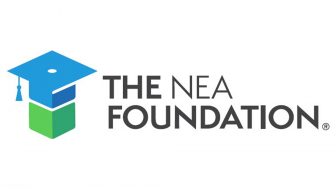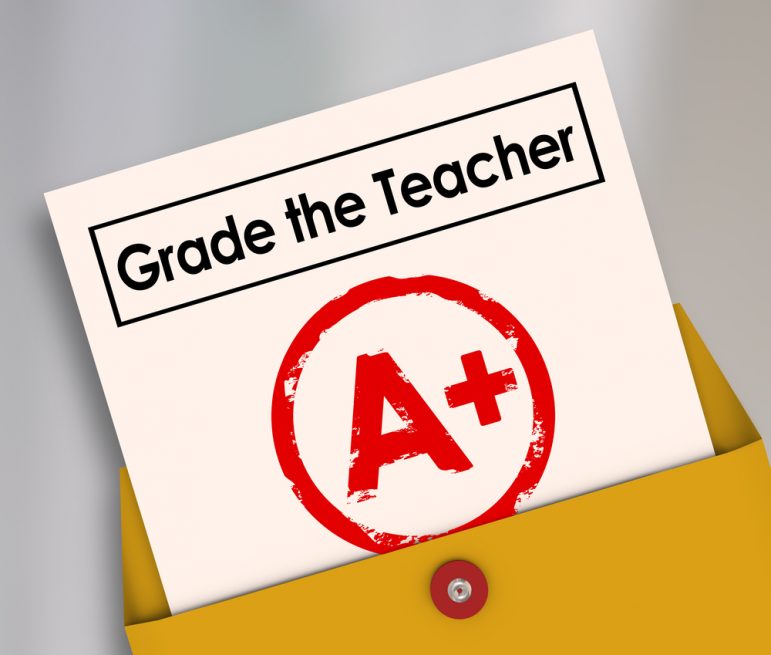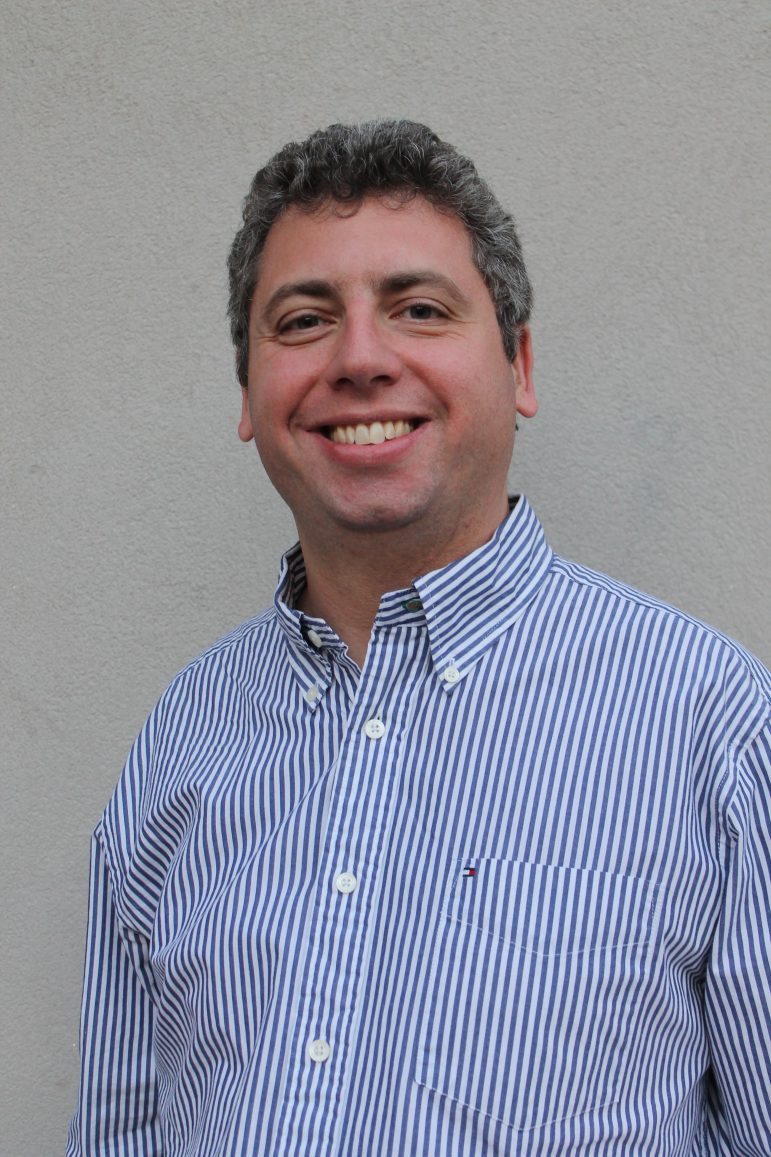Loveland E.A. Educator Selected as 2020 NEA Foundation Global Learning Fellow
Learning journey to prepare Loveland High School’s Abra Koch and students as global citizens

The NEA Foundation, a public charity founded by educators for educators, recently named Abra Koch, a Spanish educator at Loveland High School, in southwestern Ohio near Cincinnati, as a 2020 NEA Foundation Global Learning Fellow.
As a Fellow, Koch will spend a year in a peer learning network of 44 educators from across the country, building their comprehension of issues of global significance and ability to bring them into the classroom.
Over the course of a year, the NEA Foundation staff, partners, and program alumni will support the fellows as they immerse themselves in online coursework, webinars, and collegial study, including a two-day professional development workshop this fall and a nine day international field study next summer in Peru.
The 2020 fellows will use what they learn during the year to prepare their students for global citizenship.
 About the NEA Foundation
About the NEA Foundation
The NEA Foundation is a public charity founded by educators for educators to improve public education for all students.
Celebrating our 50th anniversary this year, the Foundation has served as a laboratory of learning, offering funding and other resources to public school educators, their schools, and districts to solve complex teaching and learning challenges. We elevate and share educator solutions to ensure greater reach and impact on student learning. We believe that when educators unleash their own power, ideas, and voices, communities, schools, and students all benefit.
Visit neafoundation.org for more information or on social media: @theNEAfoundation
![]()
 Oh Yes, We’re Social — Join the Conversation!
Oh Yes, We’re Social — Join the Conversation!
![]()
Dear So-called Average Teacher

By Julie Holderbaum, Minerva EA/OEA
Now that summer is here and you have time to breathe and reflect on the school year that just ended, maybe you’re feeling that your year was just, well, average.
If each year of your career is a song on an album, there are a number of reasons why this past school year isn’t going to make it to your greatest hits compilation.
Maybe you had a challenging schedule, a new prep or a new grade level. Perhaps you had a group of kids who didn’t work well together, or who were less academically capable than previous groups.
Maybe you had to learn how to work with a new colleague very closely, which even in the best of circumstances is a stressor. Maybe you lost your best teaching buddy to another school or district, the one whose room you could walk into, shut the door, and say, “You won’t believe the day I had” and vent your frustrations with no worry of judgement.
Maybe there was an administration change in your building that didn’t go smoothly.
Maybe your students confided in you more than usual and you know who has probation officers, pregnant girlfriends, and neglectful or abusive home situations. You know who is having sex and who is drinking on the weekends and who is bouncing from one friend’s couch to the next since there is nowhere else to live. Frankly, what you know about your kids’ personal lives is a heavy burden that weighs on you at school and does not dissipate just because you walk through your own front door at the end of the day. In fact, it gets heavier when you look around at your healthy family and your safe, comfortable home and your belongings that would be luxuries to so many of your students.
“Stress is stress and it doesn’t always stop and start as we move between home and school.”
Perhaps you had a particularly stressful personal year. You went through a breakup, or your child started driving or dating, or everything that could break in your house, broke. Maybe a loved one passed away unexpectedly, or maybe you watched someone you love die a slow death, and even though you had time to say goodbye, it still hurts deeply. Either way, grief can wash over you like a tidal wave, soaking every part of your life, even when you’re at school. Personal stress affects who we are in and out of the classroom, and professional stress impacts our personal lives as well. Stress is stress and it doesn’t always stop and start as we move between home and school.
 Maybe you feel like you didn’t do enough to support your profession this year.
Maybe you feel like you didn’t do enough to support your profession this year.
You didn’t rally at the statehouse, you didn’t email or call one single legislator, and you didn’t go to union meetings.
Social media alone bombards you with reasons to do all of those things, especially in Ohio, and it can be completely overwhelming to try to keep up with all the reasons we have to be activists, let alone make time to take action.
And then maybe you looked around and saw teachers who can do it all.
Nothing average about them, not this year or any year.
They advocate fiercely and ceaselessly for public education, create new ways to teach old material that inspires students and garners positive attention from administrators, and they balance work and school stress with aplomb. They have boundless energy, unlimited ideas for positively impacting kids and schools, and good days far more often than bad. They reap the rewards of their efforts with outstanding test scores and any number of teacher awards or honors. They are resilient and resourceful and recognized, and THEY ARE CHANGING THE WORLD while you are just trying to get through the day and the faculty meeting at the end of it.
Listen. Those teachers don’t exist. Some people fake it better than others, but we all have work stress that weighs on us, problems that can’t be solved with a new lesson plan. We all have personal lives that involve some broken hearts and broken appliances. We all recognize the value of the work of the OEA to help teachers advocate for our students and our working conditions, but we can’t be Norma Rae standing on a table holding high a sign that says UNION every day. After all, it’s hard to teach while holding a sign and standing on a table.
True, it’s important to strive toward professional success and to have compassion for our students, even if their stories weigh on us. It’s important to have rich personal lives, even if they are, at times, painful. It’s important to fight for public education, even though the battles can be exhausting.
But it’s equally important to recognize that no one can excel at every part of life for any extended period of time. For various reasons, we have years that are simply average, probably more often than not. You know why there are movies about Erin Gruwell (Freedom Writers) and LouAnne Johnson (Dangerous Minds). Because teachers like that, as wonderful as they are, are anomalies. Most of us never reach those heights and no one expects us to.
 Dave Stuart Jr., in his excellent book These Six Things, articulates this concept so well: “We are never finished becoming the teachers we hoped we’d be when we first set out.”[1]
Dave Stuart Jr., in his excellent book These Six Things, articulates this concept so well: “We are never finished becoming the teachers we hoped we’d be when we first set out.”[1]
The key is in the phrase “never finished”. Maybe you had an average year, for whatever reason. But think back to your first years of teaching. Are you better now than you were then? Most likely you are. There is no guarantee that we will one day be adorned with accolades and gold medals for teaching greatness. However, if we continue to strive to have a positive impact on the kids who walk into our classrooms every year, I think we are doing the job right.
We don’t always see, in immediate hindsight, the seeds that we have planted and the impact that we have had. During your “average” year, you may have unknowingly made one comment that turned around a student’s perspective on your subject area or even on his life.
I am admittedly biased, but I think a teacher who does an “average” job is still doing superhuman work that most people outside of education could not handle for a week, and even our average work can have a significant positive outcome on someone’s life.
When I became an educator, my high school government teacher told me that one of the blessings of teaching is that there are so many starts and stops. In no other profession are there so many built-in chances to begin again, whether it’s after a long weekend or at the dawn of a new school year.
So enjoy this momentary stop. Take a well-deserved rest. Appreciate the time to reset and rejuvenate. Reflect on the year that ended but look forward with hope to the year that is coming and the opportunity to continue working to be the teacher you set out to be when you first started. And then, in a few months, begin again.
[1] “These 6 Things – Dave Stuart Jr..” https://davestuartjr.com/these-6-things-how-to-focus-your-teaching-on-what-matters-most/. Accessed 13 Jun. 2019.
— Julie Holderbaum is an English Instructor and an Academic Challenge Advisor at Minerva High School, Minerva, Ohio.
Silent Tears
#OvertestedOH #RedForEd
OEA Guest Blog | By Tina Allen, ColumbusEA/OEA
 I am a fourth-grade teacher in Columbus City Schools.
I am a fourth-grade teacher in Columbus City Schools.
One of the most devastating and heartbreaking days of my teaching occurred when one day, unexpectedly, one of my students silently put her head down on her desk. Upset with her score on a state-mandated middle-of-the-year test, she began to cry.
She had begun the new school year on the heels of attending summer school because she was unsuccessful in passing the high-stakes Third-Grade Reading Guarantee the year before.
Traumatized By Testing
She had been traumatized by testing. I had seen that expression before. I’ve discussed it with other educators as well as have seen it in other students equally traumatized by the testing process.
As the tears ran down her face, I was speechless and felt disgusted inside.
“I joined this profession to change lives, to educate, motivate and inspire. High-stakes testing almost took that away from me”
Had Testing Traumatized Me Too?
“What had I done?” I asked of myself.
Recognizing she had at least two more standardized tests on the horizon as well as I-Ready assessments, reading assessments, and progress monitoring, I then asked myself, “How can I help her through this? “
It made me realize that unknowingly, I, too, had been traumatized. I was becoming to concerned about “what they needed to know to pass the test” versus “what are they are learning.” Yes, I am advocating for a reduction in high-stakes testing and the creation of alternative pathways for promoting students onward to the next grade.
I joined this profession to change lives, to educate, motivate and inspire. High-stakes testing almost took that away from me.
The tears of a fourth grader reminded me what’s important.
Tina Allen is a member of the ColumbusEA/OEA and a fourth-grade educator at Columbus Cassady Elementary School
![]()
Click here for more #OverTestedOH & #RedForEd Voices and How to Make a Stand
Nominate an Outstanding Teacher for ODE’s Newest Professional Recognition

In collaboration with the Ohio Department of Education (ODE), Ohio’s TORCH recognition honors five extraordinary teachers annually by celebrating their efforts to model strong character and a heart for their students, colleagues and community.
TORCH recipients should demonstrate dedication to social justice and personal commitments to their communities. They also should hold themselves and others accountable to the ideals of compassion, integrity, honor and respect.
TORCH honorees are recognized at surprise presentations, so all nominations should be kept confidential.
Eligibility Requirements: A nominee must meet the following criteria:
- Possess a current Ohio teaching license;
- Have at least three years of teaching experience;
- Work full-time in prekindergarten through grade 12 at a state-approved public or community school;
- Work directly with students at least 50 percent of the time;
- Plan to continue in active teaching status.
Teachers, administrators, community members, parents or students can nominate outstanding teachers for TORCH recognition. Email this nomination form to torch@education.ohio.gov by Jan. 31, 2019. | Click Here for Additional TORCH Program Details
This Does Not Compute
My hands hovered over the keyboard as my brain caught up to what my fingers had just typed. Did I really just make that comment to a student? “The computer won’t know that this fragment works as part of your style; it will just see a sentence fragment and most likely will ding you for it.”
Even before responses were graded by computers, AIR tests were never looking for a piece of writing that demonstrated a unique voice and style, but rather a piece of writing that included enough elements on a checklist for the assessor to deem the text “proficient”. Still, with human assessors, there was the opportunity to wow the grader, to stand out from the other essays in some way. Now, I fear that essays that stand out too much might actually lose points for not aligning closely enough to the templates used to program the machine for that particular essay prompt.
In addition to worrying about writing a too-unique response for a computer, a student must also worry about not using enough original language in his response. 3rd Grade AIR test responses are being given zero points if there is too much wording from the question in the student’s answer. Many students are taught to restate the question to help guide their writing, but now, with machines scoring their work, that can result in a score of zero. Curiously, tests regraded by humans at the request of school districts are not seeing a significant number of scores changed. I wonder if we are training computers to grade like humans or, sadly, training humans to grade like computers.
Anyone not familiar with the high school AIR ELA tests might be shocked to learn that only 30% of the student’s response is expected to be original. That seems like a very low amount of original text. However, students are asked to read a few passages and then cite the passages extensively in their essay response. Indeed, four of the ten points possible on the essay are based on Evidence and Elaboration. Students are expected to include “smoothly integrated, thorough, and relevant evidence, including precise references to sources and an effective use of a variety of elaborative techniques (including but not limited to definitions, quotations, and examples) . Do the machines recognize “precise evidence” and quotations from sources as support for the writer’s argument? Or do they simply register unoriginal (copied) language and give the essay a zero?
The rest of the high school rubric is troublesome, too. To earn the highest scores, students are supposed to use a “variety of transitional strategies” in their response. Can a computer recognize strategies or does it just count transitions?
Students are expected to include a “satisfying” introduction and conclusion. How can a machine determine satisfaction?
A good essay response will maintain an “objective tone”. How does a computer even begin to recognize tone, let alone determine whether or not it has been maintained?
Students desiring the highest scores need to use “appropriate academic and domain-specific vocabulary” in their response. How can a computer determine if a vocabulary word was used appropriately? Can it even tell if the word was used correctly?
Evidence used in a response must be “smoothly integrated”. A computer can be programmed to look for quotation marks indicating a direct quote from the passage, but can it tell how well that quote has been integrated into the essay?
No, I am simply not convinced that a computer can assess a piece of writing in any fair or meaningful way.
All that aside, there’s another more important concern I have with our students writing for a computer audience. Writing is used to communicate in myriad situations, but at its core, writing is an art form. One of the late Robin Williams’ greatest performances was as the English teacher John Keating in the movie Dead Poets Society. In the film, Mr. Keating challenges his teenage students to see the beauty and power of the written word: “We don’t read and write poetry because it’s cute. We read and write poetry because we are members of the human race. And the human race is filled with passion. And medicine, law, business, engineering, these are noble pursuits and necessary to sustain life. But poetry, beauty, romance, love, these are what we stay alive for.” Don’t we want our students to find a creative outlet that allows them to express their true selves? To find some art form, perhaps writing, that gives their lives meaning? I doubt that learning to write a standardized test essay, especially one written for a computer, will encourage any student to explore the beauty of the written word. And if today’s young writers aren’t being encouraged to create pieces that express their unique view of the world, will there be any engaging texts to read in the future? Or will we lose the beauty of a Fitzgerald metaphor, the power of a Maya Angelou poem, the lasting impression of a Dickens first line?
The idea of a computer assessing any art form is ludicrous. Could a computer assess a painting? Perhaps it could be programmed to look for certain colors or shapes, but the overall feeling of the painting would not be well-represented by that analysis. A computer could be programmed to analyze certain chords or rhythms or key changes in a song, I suppose, but none of that would adequately measure the power of the music, the way the song makes the listener feel upon hearing it. To extend an old cliche, expecting computers to meaningfully assess any artistic endeavor would be like trying to comprehend the beauty of the forest by analyzing individual tree branches and leaves.
John Keating also told his students that “No matter what anybody tells you, words and ideas can change the world.” There is a monumental difference between teaching our students to use language in a way that will change the world and teaching our students to earn a good essay score from a computer. I shudder to think of how the testing generation we are producing will view the world and the role of language in it. When they write, will they imagine a lover’s heart being moved by the beauty of their poem? Will they envision a mind changing, a society evolving because of the power of their impassioned arguments? Or will they simply see yet another screen on the receiving end of their writing?
I used to encourage my students to use the introduction of their AIR test essays to “wake up” the human assessor who had probably already read dozens of essays about the same topic. Now, I must teach them to consider how a programmed computer might view their words. And that, I’m afraid, could have a devastating impact on how my students might view the world.
The Sound of Silence … Worth the Consequences?
 One of the first lessons a child learns in school is to listen and be quiet. Silence is often desired in schools, unless we ask for participation. But lately, I’m beginning to wonder if we are doing our students a disservice when we emphasize the value of silence … because there is also a danger in certain kinds of silence.
One of the first lessons a child learns in school is to listen and be quiet. Silence is often desired in schools, unless we ask for participation. But lately, I’m beginning to wonder if we are doing our students a disservice when we emphasize the value of silence … because there is also a danger in certain kinds of silence.
As part of a study of Art Spiegelman’s Maus books and the Holocaust, my sophomores recently viewed a visual testimony of Kurt Messerschmidt. A young man during the Holocaust, he witnessed German soldiers forcing an older Jewish man to pick up some broken glass from the windows of a destroyed Jewish business on Kristallnacht. He noted that while he and a friend helped the old man pick up the glass, many other people stood by and said nothing. He believes that there were certainly other people who disapproved of the Nazis’ actions, but “Their disapproval was only silence, and silence was what did the harm.”[1] Sonia Klein, another Holocaust survivor who was interviewed after the riots in Charlottesville, warned that “Silence is the first thing after hate that is dangerous, because if you are silent, it’s an approval of what’s going on.”[2]
At the end of the Holocaust unit, I asked my students to read an article about Martin Niemoller[3] and his now famous words about remaining silent when other groups were persecuted and finding no one left to speak out for him when he was targeted. I asked my students how Niemoller’s words might apply today. One girl answered quite simply and succinctly: “We can apply these words to today by not allowing something that we wouldn’t want to happen to us to happen to somebody else.” She makes an excellent point. Maybe it’s not as simple as teaching the Golden Rule (do unto others as you would have done unto you). Maybe it’s time to teach kids to advocate for those being slighted or hurt in our world, even if they aren’t directly involved with the victims or the perpetrators.
In another class this week, my juniors read Walt Whitman’s poem “I Sit and Look Out”[4], a poem in which the speaker gazes out at “all the sorrows of the world, and upon all oppression and shame”. He lists several of those sorrows he observes in the world, including “treacherous seducer(s) of young women,” and “slights and degradations cast by arrogant persons upon laborers, the poor, and upon negroes, and the like.” The poem ends with the line “All these — All the meanness and agony without end, I sitting, look out upon,/See, hear, and am silent.” We discussed why the speaker in this poem (and people in general), upon seeing someone in need, choose silence over speaking out, and choose passive observation over direct action. My students mentioned greed, selfishness, and fear. They also decided that sometimes people may not even be aware of a need, or if they are, they might feel that one person’s actions or words would not make a difference.
My juniors were also familiar with Ralph Waldo Emerson’s belief that “for nonconformity, the world whips you with displeasure,” so I suggested that perhaps another reason people choose silence over action is that they have seen what has happened to others who spoke out. Colin Kaepernick peacefully protested an issue which plagues our society today (and which Whitman wrote about in his poem over a hundred years ago). And for that, Kaepernick lost his job. When other players knelt in solidarity with him, the President chimed in with profanity directed toward those players, critics berated the players who protested, and the news media, for weeks, was centered on this issue, this scandal, started by one man’s peaceful act of nonconformity and civil disobedience intended to speak out against an injustice. Heather Heyer, an anti-racism activist who went to Charlottesville to protest the hatred spewed by white supremacists, paid with her life for her efforts to stand up against an injustice.
So is speaking up worth it? It’s not as safe as remaining silent, that’s for sure, nor is it as easy. There are certainly repercussions that come from speaking our beliefs in “words as hard as cannon balls,” as Emerson implores us to do in “Self-Reliance”, and many of those consequences are not pleasant. But can our society afford to continue sitting by in silence as injustice and oppression happen around us?
Whitman’s poem “I Sit and Look Out” was written in the late 1800s. My students and I realized that of all the sorrows he lists, 13 in total, we still have every single one in our society today, with the exception of famine at sea. What does it say about humanity that over 150 years later, we have not figured out a way to eliminate these man (and woman)-made sorrows from our world? Where has silence gotten us?
As teachers, we can appreciate a quiet classroom, heads bent over desks, the only sound pencils scribbling as our students diligently work on an assignment. But I am going to make certain that in 2018, I make it a priority to teach my students the beauty of using their voices to break inappropriate silence and advocate for others. Maybe we can manage to address at least some of the sorrows that Whitman wrote about all those years ago if we help the next generation be equipped to do more than sit silently by and wait for someone else to take action.
[1] “Studying the Holocaust – Echoes & Reflections.” http://echoesandreflections.org/unit-1-studying-the-holocaust/. Accessed 16 Nov. 2017.
[2] “Holocaust survivor: Silence is ‘approval’ of racism – CNN.com.” 14 Aug. 2017, http://www.cnn.com/videos/us/2017/08/18/holocaust-survivor-warns-against-silence-charlottesville-nazis-sg-orig.cnn. Accessed 16 Nov. 2017.
[3] “Martin Niemöller: “First they came for the Socialists…”.” https://www.ushmm.org/wlc/en/article.php?ModuleId=10007392. Accessed 16 Nov. 2017.
[4] “83. I Sit and Look Out. Whitman, Walt. 1900. Leaves of Grass.” http://www.bartleby.com/142/83.html. Accessed 20 Dec. 2017.
Is Revised RESA a Reason to Rejoice?
Part II of II: Teacher Perspectives on the Resident Educator Summative Assessment
Read Part I: My Marathon Swim Through RESA
 by Dan Greenberg, Sylvania Education Association
by Dan Greenberg, Sylvania Education Association
I’m getting to a place where I can look back nostalgically on twenty years in the classroom — back to the days when I was 22, teaching in Adelanto, California, and couldn’t get used to people calling me “Mr. Greenberg,” — a time when I rushed through my lunch in the teacher’s lounge, so I could go play pick-up basketball with the kids.
I don’t gloss over those early years of my career. There were plenty of challenges that made me wonder if I would be able to make it as a teacher.
However, I think the challenges facing today’s early career educators make mine seem laughable. And of all of today’s challenges that I am grateful I avoided, RESA (Resident Educator Summative Assessment) is at the top of the list.
When I graduated from Kent State in 1997, I took two Praxis tests to get my teaching license. That was it. I was official! As for additional requirements from the state, there was nothing more for me to do. As long as my principal was happy with my performance, I could continue teaching.
Compare that to today: a four year Resident Educator program with rules, and meetings, and videotaping, and student work samples, and on and on, all while young teachers are trying to get a handle on day-to-day lesson delivery. Wouldn’t it be better for kids if their teachers didn’t have to worry about the redundant RESA process?
I say redundant because these early career educators had plenty of tasks like RESA to complete during their student teaching experience. If they completed them satisfactorily then, why are they having to prove themselves to a testing company and the state once again?
Now I know that RESA went through an overhaul over the summer. For a while, some first and second year teachers were checking with me every day, hoping the whole program would be eliminated. But somehow — through a process that might best be communicated by a “School House Rock” cartoon — we ended up with a revised form of RESA that, among other changes, significantly cuts down on the tasks a third year RESA teacher must submit to the state.
Are my young colleagues and I jumping for joy? No. Not really.
Sure, we are glad to see a reduction in required tasks. Sure, we are glad that more of the RESA program is controlled at the local district level. We know it is a step in the right direction. However, it’s still a program that we see as mostly redundant and unnecessary.
For me, I see RESA changes like standardized testing changes. I’m glad the state has reduced the number of tests students must take, but do I think the state has fixed the problem of over-testing students? Absolutely not.
RESA is still a burden on local school districts. The cost to my district, just to facilitate year 3 of the Resident Educator Program, will be $15,000 this year. That may not be a huge percentage of our budget, but it is one more thing to pay for instead of other programs.
RESA will continue to frustrate educators, whether for its lack of timely, detailed feedback on assessments, or its illogical requirements for teachers shifting between old and new RESA requirements.
For example: Last year a teacher failed one section of her third year RESA tasks. She failed the section because the student work she submitted was deemed illegible by the evaluator. By Ohio law, she could not resubmit a clearer copy. This year, according to the revised RESA process, instead of having to redo the task, she’ll get mentoring at the local level to help her in that area. However, the only reason she didn’t pass had nothing to do with her competency as a teacher. What kind of mentoring can she possibly receive to address this issue?
On the subject of mentoring, I realize that keeping the RESA requirement for local school districts to provide mentors is a positive thing. I can’t imagine what I would have done without a veteran teacher working with me almost every day, helping me with curriculum and lesson delivery.
My hope for new teachers is that the Resident Educator program continues to evolve into something that truly helps them grow as professionals, instead of something cumbersome and frustrating. I want them to be able to look back in 20 years, with a sense of nostalgia for the beginning of their career, not with a shudder and shiver down their spine, as they recall the hoops they jumped through to complete the Resident Educator program.
Learn more about changes to Ohio’s Resident Educator Program
Save
Save
Part II: Teaching, post-Charlottesville
By Dan Greenburg, Sylvania Education Association
As I plan my lessons for the start of a new school year, I hear student voices in the back of my head, asking “Why do we have to learn this?”
I use that question to guide what I teach and how I teach it.
I find the best way to address that question, without students even having to ask it out loud, is to link literature and writing lessons to things that are relevant to my students, to things that are happening in our world.
When we read Catcher in the Rye, we talk about how Holden Caulfield might have been impacted by social media. Would he have found a community of teenagers just as disillusioned with life as he was? When we read The Great Gatsby, we compare the American dream of the 1920s to today. We talk about college affordability and how that impacts the dreams and goals of students.
Relevancy is the key to my lessons.
Over the past year or so, however, I have found it increasingly challenging to remain relevant. As we become more polarized politically and culturally, I am finding it harder and harder to discuss controversial issues in class. I am actually afraid of the repercussions.
Last February, I taught my 10th grade English class a six-week lesson about persuasion and argumentation. As part of the unit, we talked about using facts to support claims, and the importance of using reliable sources. At the same time, we were studying this, a website called “Uncle Sam’s Misguided Children” published a blog titled: “Is an Ohio High School Teaching Kids to Hate the President.” That blog was about my school. It was clearly biased, and completely inaccurate in its portrayal of our school. It was shared close to 4000 times.
I thought: This is a teachable moment. What better way to demonstrate the problem with unreliable sources than this article, which completely misrepresents our school? Discussing how many times this article has been shared, I can explain how false information is easily circulated on the internet.
With those thoughts in mind, I copied the article and made it the focus of our lesson. I prefaced the lesson by saying we are not focusing on anyone’s feelings about the President or anyone’s political beliefs. This is about the reliability of sources.
I thought I had things covered. I did not.
The discussion seemed to be going very well in class, but within 25 minutes, I got a call from the guidance office to send a student down. I later found out this student sent a text to a parent, saying he was uncomfortable with the lesson. By the end of the period, my principal was in my classroom. At the end of the day, my co-teacher and I had to submit our lesson plans to the Assistant Superintendent.
I do not fault the district at all. They needed to proceed with due diligence. On an intellectual level, I completely understood this. It didn’t stop me, however, from being terrified about the process.
In the end, the district supported me. There was no reprimand. There was a good discussion with the Assistant Superintendent about the process.
There was a lasting consequence, however.
I am weighing the risk/reward of raising “touchy” subjects in my lessons. I even added a section to my course syllabus, stating that is never my intent to push political beliefs or ideologies from the front of the classroom. I will address the issue this coming week at open house, as well.
My American Literature class will start the year reading One Flew over the Cuckoo’s Nest. It presents so many opportunities to connect to our world today, particularly in the aftermath of the events in Charlottesville and the issues related to the taking down of Confederate statues and monuments. It’s not a matter of pushing a viewpoint; it’s a matter of engaging students on a relevant topic and fostering critical thinking skills.
It’s my hope that, by communicating my expectations and intent to parents and students at the beginning of the year, by letting parents and students know I am willing to talk about and address their concerns, that we’ll be able to have thoughtful dialogue in class throughout the year.
I’m sure there will be the occasional “why do we have to learn this?” However, I’m optimistic that connecting lessons to issues that matter to students will greatly reduce the number of times the question get asked.
Read Part I: Teaching, post-Charlottesville
Save
Save
Save
Part I: Teaching, post-Charlottesville
By Julie Rine, Minerva Education Association
If we haven’t already, many of us will soon be giving a lecture about the importance of being respectful to others, following the rules, and being nice. We are going to discuss how name-calling is not appropriate, and how we should all stand up for anyone who is being bullied or intimidated or hurt. During that first day of school lecture, I often tell my high school students that we can’t control what happens in the world outside of our school, but we can control the atmosphere in Room 201. I emphasize that it will be a place where we can all expect to be accepted and valued, a place where we can feel safe and free from violence or harsh words.
This year when I give that talk, it will mean more than ever. For just at the time when school is beginning for most kids and teachers, our country has seen powerful scenes of breaking those rules in full technicolor, complete with torches and clubs and shields, chants and profanity and ethnic slurs, and in the end, murder.
Sitting in our classrooms listening to our rules and expectations are going to be students of various ages, backgrounds and beliefs. It’s not our place to raise those kids or instill our values in them. That job belongs to their families, but teachers can have a powerful impact as well. What exactly is our role when it comes to teaching values? Certainly the concepts of respect, tolerance, and fairness are not strictly liberal or conservative values. Teaching our children that it is not acceptable to label, judge, or mistreat someone based on their skin color, religion or nationality should not be an area of disagreement between Republicans and Democrats.
A former teacher of James Fields, the driver of the car that plowed into the protesters in Charlottesville, said that he felt he had failed as a teacher.* I do not think he failed; he did everything in his power to expose his students to the atrocities of the Nazis in Europe and to relate his lessons to current events. However, his comment did make me reconsider my own decisions as a teacher.
When teaching To Kill a Mockingbird or Maus (a book about a Holocaust survivor’s experience), I try to fit in current articles about the issues of race and prejudice that arise in the books. But when I first started teaching those texts, I did more than squeeze in those connections. My students used to engage in a plethora of activities to help them further analyze how the ugliness of the past can still influence the events of today.
So what changed? High-stakes standardized testing came along. Each year I have left out more and more of the meaningful extension activities in order to allow extra time for test prep. What if my actions have had more dire consequences than I thought? Maybe it’s time that test prep falls into the “squeezing in” category. Maybe it’s time to stop worrying about growth measures and keep or even expand the material and activities that help grow decent human beings.
To be clear, the overemphasis on testing has not lead to a bumper crop of racists and white supremacists, and the teachers who drop time-consuming but worthwhile material to make room for test prep are not to blame for any future abhorrent actions of their students. But could we be doing more to teach tolerance and acceptance?
The ACLU, who went to bat for the organizers of the recent Charlottesville event after their permit was revoked, argues that freedom of speech should be defended for everyone, even those whose views are repugnant to most people. Ideally, everyone gets a voice, and then everyone can form his or her own decision, after “reasonable discourse and debate.”**
Isn’t it part of our job to teach how to engage in reasonable discourse and debate? We can do this while analyzing topics other than politics, of course, but maybe it’s time to stop backing away from political topics when they arise within the context of our lessons. When students start discussing their political views in our classrooms, maybe we should guide those conversations instead of shutting them down to avoid a heated discussion. After all, it is possible to disagree with someone without espousing hatred for others or inciting violence, and we should be modeling that. Furthermore, there is a difference between those who advocate for the right to dominate or subjugate others and those who stand up for the rights of all people to live peacefully without fear of unjust oppression. We need to make that distinction clear to our students, now more than ever.
A few weeks ago, teachers across the country recognized the faces of white supremacists carrying torches on a hot Friday night in Virginia, and they remembered them not as men, but as kids, sitting in their classrooms on the first day of school listening to the Rules and Expectations lecture about respecting others. I can’t imagine seeing one of my students, past or present, at one of those rallies as a participant. But if I do, I don’t want to feel that I could have done anything differently to elicit a better outcome in the forming of his beliefs.
When there is a back-to-school lecture on rules and expectations, let us mean it and let us enforce it, even if it means having some uncomfortable conversations. When there is a way to incorporate current issues while studying the difficult lessons of the past, let us connect the two. When there is hate speech, let us not be weak-willed and call it a mere difference of opinion. Let us be clear that it is a despicable opinion that is not acceptable in our schools or in our streets. When there are teachable moments relating to political issues, let us embrace them. Let us model civil discourse, but when there is racism or prejudice, blatant or subtle, let us confront it without ambiguity.
Debates about freedom of speech, whether or not statues should stay or go, and what to do with the Confederate flag in public places will keep cable news shows busy for a long time to come. But there is a clear right and wrong when it comes to hate speech, a definite line that should not be crossed, and that line must not be erased in our classrooms.
Read Part II: Teaching, post-Charlottesville
*”Teacher says suspected Charlottesville driver James Alex Fields Jr ….” 13 Aug. 2017, http://www.post-gazette.com/news/nation/2017/08/13/James-Alex-Fields-Charlottesville-killing-driver-car-crowd-white-nationalist-rally/stories/201708130175. Accessed 21 Aug. 2017.
**”Why the ACLU defends white nationalists’ right to protest – Vox.” 12 Aug. 2017, https://www.vox.com/policy-and-politics/2017/8/12/16138326/aclu-charlottesville-protests-racism. Accessed 17 Aug. 2017.
Save
Save
Save
Save
Save
Save




